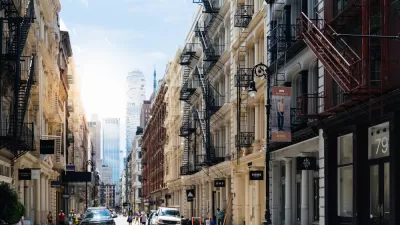Places Journal has launched a series titled "The Inequality Chronicles." Expect high-quality longform articles.
"The Inequality Chronicles" series by Places Journal began this month with a story titled "Memphis Burning," which sets the stage with a fire on February 26, 1953, when a fire burned down the home at 384 South Lauderdale Street. That kind of historic scope is reflected through the piece—which tells a history of racism as it has manifested in the housing market of Memphis since before even the beginning of World War II. The key theme that emerges from the history told by Preston Lauterbach: "Inequality is enforced in Memphis, and it always has been."
Michael Berryhill pens the second installation of the series, lending the same variety of ambitious scope and journalistic rigor to the story of East Aldine, a 15-square mile area of unincorporated land in the middle of metropolitan Houston. Berryhill details a partnership between East Aldine and Neighborhood Centers Inc., " a nonprofit group that has quietly backed Houston’s poor for more than a hundred years."
After introducing Angela Blanchard, the director of neighborhood Centers, Berryhill describes the fundamental dynamics of the partnership:
It’s tempting to say that East Aldine is Angela Blanchard’s next project, but that would be misleading. She is East Aldine’s next project. Neighborhood Centers preaches a gospel called appreciative inquiry. Instead of barging into a community and telling residents what to fix, Blanchard’s organizers listen. They identify local leaders and ask what they can do to help. While many nonprofits talk about bottom-up organizing, this one takes it to another level. “We are so fanatical about treating people with respect,” Blanchard said. “It is embedded in the culture. We train on it. We teach other people.”
If the Neighborhood Centers name and method sounds familiar, you might have read the chapter about the organization in The Metropolitan Revolution, by Brookings Institution analysts Bruce Katz and Jennifer Bradley.
Both of the articles in the series so far are highly recommended for planners and anyone else interested in tackling the complex and varied problems of inequality.
FULL STORY: Memphis Burning

Planetizen Federal Action Tracker
A weekly monitor of how Trump’s orders and actions are impacting planners and planning in America.

Maui's Vacation Rental Debate Turns Ugly
Verbal attacks, misinformation campaigns and fistfights plague a high-stakes debate to convert thousands of vacation rentals into long-term housing.

Restaurant Patios Were a Pandemic Win — Why Were They so Hard to Keep?
Social distancing requirements and changes in travel patterns prompted cities to pilot new uses for street and sidewalk space. Then it got complicated.

In California Battle of Housing vs. Environment, Housing Just Won
A new state law significantly limits the power of CEQA, an environmental review law that served as a powerful tool for blocking new development.

Boulder Eliminates Parking Minimums Citywide
Officials estimate the cost of building a single underground parking space at up to $100,000.

Orange County, Florida Adopts Largest US “Sprawl Repair” Code
The ‘Orange Code’ seeks to rectify decades of sprawl-inducing, car-oriented development.
Urban Design for Planners 1: Software Tools
This six-course series explores essential urban design concepts using open source software and equips planners with the tools they need to participate fully in the urban design process.
Planning for Universal Design
Learn the tools for implementing Universal Design in planning regulations.
Heyer Gruel & Associates PA
JM Goldson LLC
Custer County Colorado
City of Camden Redevelopment Agency
City of Astoria
Transportation Research & Education Center (TREC) at Portland State University
Jefferson Parish Government
Camden Redevelopment Agency
City of Claremont




























